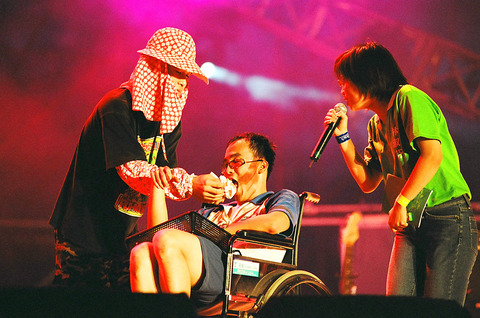Known for his outrageous on-stage antics, his brazen and often inflammatory remarks and his blatant and unabashed belief in Taiwan's independence, Ko Ren-jian (
In the 15 years he's been the mouthpiece for working class politico-punk combo, LTK (
He's set off fire extinguishers and aimed them into the audience, he's hit band members over the head with beer bottles, he's set alight the band's instruments while on stage and, as if all that isn't enough he's instigated the odd riot or two.

PHOTOS: TCM
Should you run into the eloquent and mild-mannered Ko on the street, however, you'd probably be hard-pressed to believe he was capable of such anti-social behavior. But as anyone who has caught LTK in the act will attest, he is capable of just about anything when on stage with his band. And he does it all not in the name of rock'n'roll, but simply because it is what people have come to expect from him and his nefarious band.
"People don't come to see us to listen to the music, they come to see what we're going to say or do. And of course, they come to take part in what are best described as mini-riots," said Ko. "Our stage shows are more important than the music. People want to have a good time, they want to go mad, have a laugh and abuse us, be it verbally or by throwing things at us. It's become part of the band's image."
It might sound odd that people actually pay money to see a band not for its music but for its mayhem, but then Ko and LTK have never really been known for their musical smarts. Nor have they made any bones about their lack of musical ability.

While many an aspiring young band might consider the inability to play its instruments a rather debilitating obstacle to being able to generate a loyal following, Ko and his non-musical buddies have exploited their musical inabilities to the max. He realized very early on that you don't necessarily need to know how to play in order to attract an audience.
"At university I realized that if you stood up in public and swore and made fun of the nation's political and social systems people would stop and listen. It was easy, it didn't matter that we sounded awful," he said. "Sure, some people found it offensive, but then other students didn't and thought what we were doing was pretty cool. What we do today grew from doing these things on campus."
Along with brazenly ridiculing government and society, Ko began to incorporate short comedic skits into the band's sets. By the time the band released its debut album, The Anus of Happy Desires (
Even when the group ditched its unharmonious guitar-driven sound and began experimenting with offbeat electronica for its second album Revenge of the Taike (
"I don't think it really mattered what we did with the music by then, as we'd already built up a reputation as must-see band. We simply gave people what they wanted -- total chaos," said Ko.
It was at this time that Ko decided the short skits that had become such an integral part of the band's gigs were not quite shocking enough. He decided to make them even more provocative by adding aspects of sadomasochism. One such outrageous and crowd-pleasing parody saw him ridiculing the police force with the help of a sausage, a motorcycle helmet, a bottle of Taiwan Beer and his own genitalia.
"It was a way to express ourselves. I knew we'd shock people, but what better way is there to get people's attention, especially if you're not particularly talented musically, which we really weren't," he said. "The skits all had a meaning and were designed to help both us and the audience vent their frustrations in regards just what was wrong the country, the system and society."
Ko's often over-the-top stage shows were -- and for that matter still are -- designed to be offensive yet harmless fun. But, while audience participation often results in little but the band being pelted by various projectiles an incident five years ago nearly put an end the band's outrageous stunts.
Having been invited to participate in a concert in front of the Presidential Building in 2000, Ko's antics riled the audience into such a frenzy that when water bottles and other ad-hoc missiles did begin to fly a young female student was badly injured in the ensuring melee. In the weeks following the unfortunate incident Ko and his band found themselves in the spotlight for all the wrong reasons.
"It was an accident -- nothing else. I'm sorry the girl got hurt and I'm sorry it got out of hand, but these things happen at our concerts," he said. "She wasn't an innocent bystander -- she'd come to see us. The media didn't look at it like that. They went all out to demonize us and what we do, which was totally wrong."
Bottle throwing incidents and bad press, aside, the band has managed to survive and indeed thrive. Its gigs, be they in a muddy field in Kenting or the confines of a smoke-filled bar still attract large crowds and earlier this month Ko and LTK released their first new album in four years. And its contents could be set to surprise everyone from the most diehard fan to those who have only read about the band.
After kicking up a tuneless racket for 15 years, the band that was once proud of its musical inability has come out of its four year hiatus and released its most musically challenging piece of vinyl to date. Entitled Ten Yai Chi Tou Lang (
"We've got three new members in the band and they are young compared to me, and their fresh input has enabled us to take a very different approach this time around," he said. "To break with tradition I wanted to put lots of distinctive styles into the album and I think we managed to pull this off."
Ko's decision to mix it up with genres ranging from contemporary Taiwanese folk to mild jazz and lay off the profanity has worked. Instead of going for the throat Ko lambastes with a more tongue-in-cheek style of humor than before. And, more importantly, the crux of the album is the music itself rather than lyrics. It's a far cry from the LTK of old, but as Ko readily admits, "it was time for a change."
"People have said that we're still the same, but I tell them we're not. Sure, the gigs are still rowdy, but our music has mellowed," said Ko. "And there's no denying the fact that the album is musically superior to anything we've released in the past."

That US assistance was a model for Taiwan’s spectacular development success was early recognized by policymakers and analysts. In a report to the US Congress for the fiscal year 1962, former President John F. Kennedy noted Taiwan’s “rapid economic growth,” was “producing a substantial net gain in living.” Kennedy had a stake in Taiwan’s achievements and the US’ official development assistance (ODA) in general: In September 1961, his entreaty to make the 1960s a “decade of development,” and an accompanying proposal for dedicated legislation to this end, had been formalized by congressional passage of the Foreign Assistance Act. Two

March 31 to April 6 On May 13, 1950, National Taiwan University Hospital otolaryngologist Su You-peng (蘇友鵬) was summoned to the director’s office. He thought someone had complained about him practicing the violin at night, but when he entered the room, he knew something was terribly wrong. He saw several burly men who appeared to be government secret agents, and three other resident doctors: internist Hsu Chiang (許強), dermatologist Hu Pao-chen (胡寶珍) and ophthalmologist Hu Hsin-lin (胡鑫麟). They were handcuffed, herded onto two jeeps and taken to the Secrecy Bureau (保密局) for questioning. Su was still in his doctor’s robes at

Last week the Democratic Progressive Party (DPP) said that the budget cuts voted for by the China-aligned parties in the legislature, are intended to force the DPP to hike electricity rates. The public would then blame it for the rate hike. It’s fairly clear that the first part of that is correct. Slashing the budget of state-run Taiwan Power Co (Taipower, 台電) is a move intended to cause discontent with the DPP when electricity rates go up. Taipower’s debt, NT$422.9 billion (US$12.78 billion), is one of the numerous permanent crises created by the nation’s construction-industrial state and the developmentalist mentality it

Experts say that the devastating earthquake in Myanmar on Friday was likely the strongest to hit the country in decades, with disaster modeling suggesting thousands could be dead. Automatic assessments from the US Geological Survey (USGS) said the shallow 7.7-magnitude quake northwest of the central Myanmar city of Sagaing triggered a red alert for shaking-related fatalities and economic losses. “High casualties and extensive damage are probable and the disaster is likely widespread,” it said, locating the epicentre near the central Myanmar city of Mandalay, home to more than a million people. Myanmar’s ruling junta said on Saturday morning that the number killed had